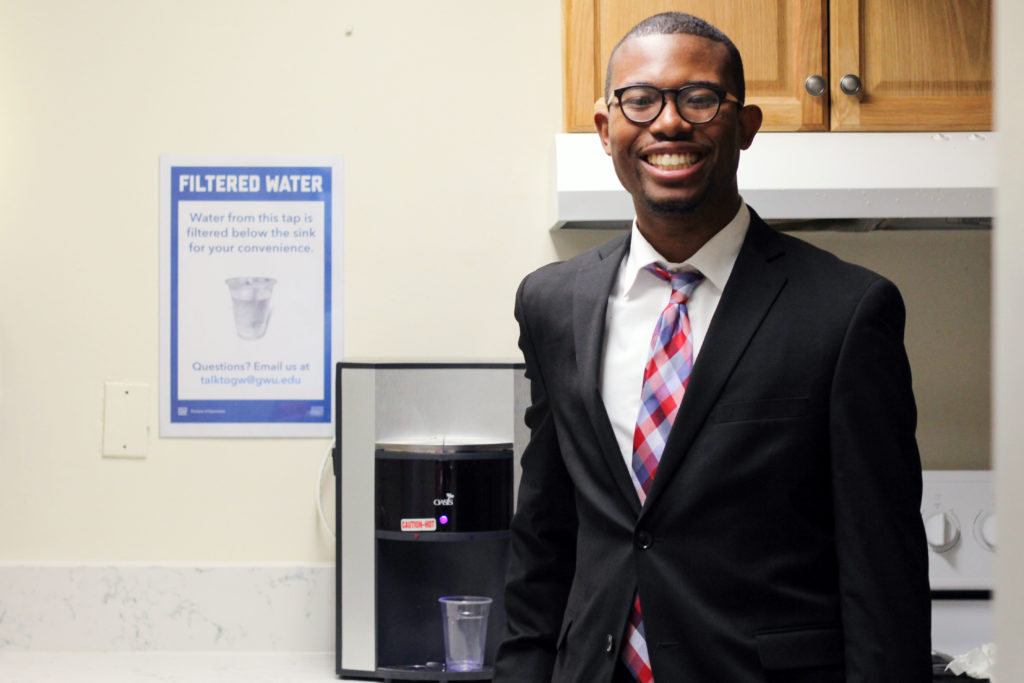Four Mount Vernon Campus residence halls are now supplied with free filtered water stations.
Officials installed four water filters earlier this month in each of the hillside residence hall communal kitchens – Merriweather, Clark, Cole and Hensley halls. More than 10 Vern residents said the filters, which provide hot and cold water, provide students with convenient access to filtered water that they would otherwise need to leave their residence halls to obtain.
Meghan Chapple, the director of the Office of Sustainability, said officials will continue to work with “groups around the University” to add water refill stations “when appropriate.”
“GW is committed to reducing plastic bottled water usage by integrating water bottle filling stations into buildings,” Chapple said in an email.
Student Association Executive Vice President Ojani Walthrust, who advocated to install the water filters, said students living in hillside residence halls previously relied on two water foundations in West Hall and one in Ames Hall to fill their water bottles. He added that several students purchased plastic water bottles and Brita filters for water in their residence hall rooms.
“Water is a huge necessity, and the alternative was you either go to Eckles and buy water bottles from the vending machines or you go to West to the water fountain,” Walthrust said.
He said the new filters will save students time and money because they will not need to leave their buildings to purchase filtered water from other places on the Vern.
“They can have Brita filters and all these things, but they should not have to pay for all these things,” he said. “GW should provide them access with all these things, which is why I advocated for it.”
Walthrust said he originally wanted to add more water fountains to the residence halls, but the Vern’s water piping system could not reach hillside buildings. Walthrust said he thought of the idea to add filters to Vern residence halls after noticing that Rice Hall had water filters of the same brand, Oasis.
Walthrust added that he worked to add the refill stations with officials like Anne Graham, the assistant director of student involvement and Greek life; Colette Coleman, the interim associate dean of students; and Dan Wright, the area coordinator for the Mount Vernon Campus.
Eleven students living in hillside residence halls said the filters provide convenient access to clean water. Students said they hope officials will continue updating hillside residence halls by adding more water stations and preventing flooding.
Junior Dulani Northover, a resident adviser in Hensley Hall, said he “greatly” appreciates the filters because they increase the quality of life on the Vern.
“We obviously had access through our bathrooms or through the kitchen sink, but it’s more reassuring to see the water is being filtered through a system,” Northover said.
Northover said RAs have received complaints from residents about a lack of access to clean water in the building. He said adding the filters shows that the University is addressing students’ concerns.
“They are hearing us and understanding us in some capacity and yielding new results,” Northover said.
Freshman Carson Dike, a resident in Clark Hall, said he purchased a Brita filter at the beginning of the academic year because he did not have access to filtered water in his residence hall.
He said the filters will encourage students to drink water out of a reusable water bottle rather than a plastic bottle. Dike said the initiative is a “step forward” for providing hillside residence halls with the same resources as residence halls on the Foggy Bottom Campus that have filtered water.
“The benefit of it honestly might just be encouraging people to drink more water,” Dike said.
Paige Morse contributed reporting.





